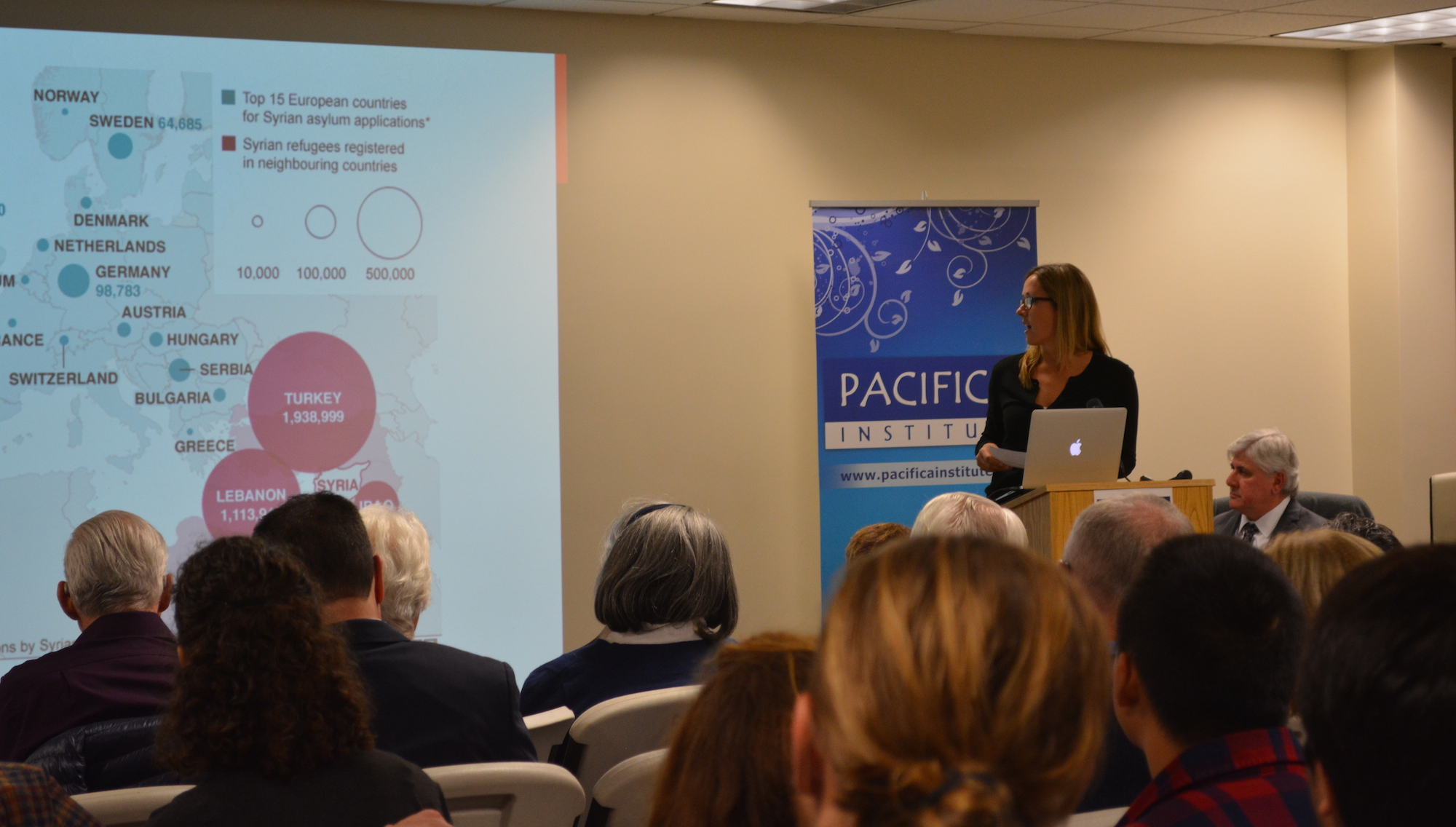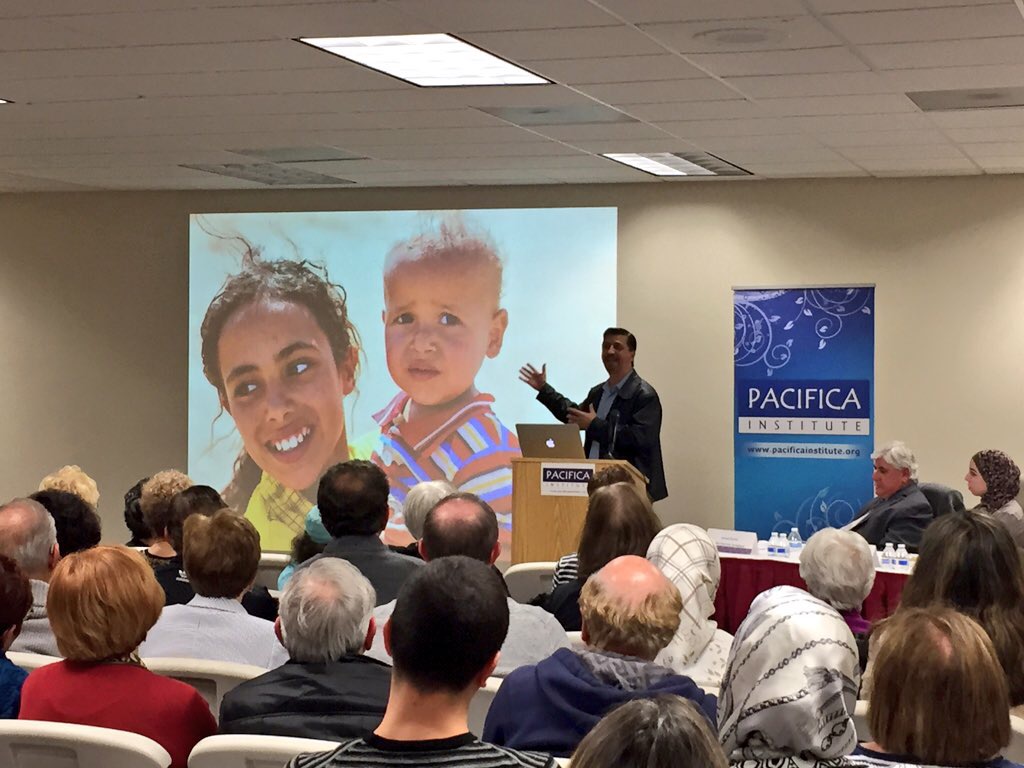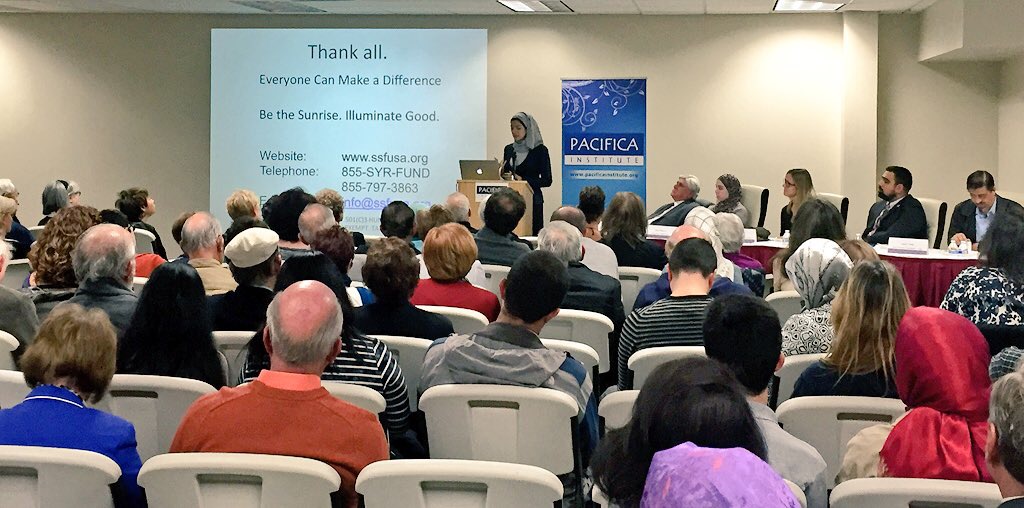On Tuesday, November 10, 2015, Pacifica Institute Orange County branch hosted a panel titled “What you need to know about the Syrian Refugee Crisis.”
The panel was mediated by Rabbi Arnold Rachlis, a spiritual leader at University Synagogue, and received his Doctor of Divinity degree from the Reconstructionist Rabbinical College. Pacifica Institute invited four panelists to take part in the discussion: Dania Alkhouli, Kelsey Norman, Haroon Azar, and Hassan Twiet. The goal of the evening was to give awareness to the humanitarian perspective of the war that has been raging in Syria for almost five years.
The first panelist, Dania Alkhouli, briefed the attendees on the organization she co-founded with her mother, A Country Called Syria. As a Syrian American poet, she approached the panel with an artistic lens by giving a background on the ancient city of Ugarit. According to Dania, the alphabet is believed to come from Ugarit and it is a place with key influences to language in the present day. While Ugarit provides only one example of the ancient sites in Syria, Dania demonstrated that the country was worth preserving both for the people and early history.
Kelsey Norman, a doctoral candidate at the University of California Irvine, focused her research on migration in Egypt and Turkey specifically. She gave interesting facts and common misconceptions regarding refugees on a global scale. According to Kelsey, refugees are not in camps; they are in rural and urban areas. For example, in Turkey only 25% of refugees are in camps. Kelsey provided a look at how challenging it is for refugees to assimilate into host countries when seeking asylum. The hardest thing for an asylum seeker is time, as the process takes a significant amount waiting and patience. Unfortunately, most refugees do not have the economic resources to wait for acceptance. She ended her presentation by stating, “The refugee crisis will not end with the Syrians, it will continue to be a global phenomenon.”
The third presenter was Haroon Azar from the United States Department of Homeland Security. Azar made it clear that while America is a nation of immigrants, there are certain measures that have to take place in order to keep Americans safe. Azar expressed, “…homeland security begins with hometown security first.” He provided some additional information regarding what the U.S. is planning on doing with the current refugee crisis. According to Azar, since the start of the Syrian conflict the United States has contributed 4.5 billion dollars in humanitarian aid, of which 2.3 billion dollars went directly to aid refugees. Azar recognized that there are issues with the balancing act of security vs. refugee resettlement; however, this will not stop the U.S. from providing aid for people in and outside of the country.
The last panelist to speak was Hassan Twiet, a Syrian immigrant, who migrated in 1983 and board member of Sunrise-USA. Hassan focused his presentation on the children who have been internally and externally displaced by the war. According to Hassan, 5.5 million children have been affected, 4.29 million are poor, displaced, and caught in the line of fire, and 1.25 million are living outside Syria. He displayed pictures of the extensive damage the war has done to the people and the cities of Syria. He concluded by motivating the attendees to help the cause by reaching their local representatives, The White House, and donating to charities.
Salma was invited to share her individual narrative as a Syrian refugee, who recently came to the United States to escape her war-torn homeland. Salma was forced by her family to leave Syria in 2013 after the first known chemical attack in Ghouta. Although she came from a wealthy family, she realized money could not change her struggles in assimilating into the United States. In her opinion the only thing that could change her life was obtaining an American passport, which she was not willing to do unethically. Salma was filled with emotion as she expressed her doubts of being able to make a difference for the Syrian people forced to leave their country. She turned her doubts into a positive message by stating, “It took a lot of negative comments to break my heart into pieces, and one act of kindness to glue it back together.” Her statement referred to the lack of support the Syrian community is receiving globally; however, she managed to shine a glimpse of hope for Syria.
The evening concluded with closing remarks by Maria Khani of Access California Services. She encouraged people to visit the organizations set up at the panel to learn more information on how to help the Syrian cause.
Pacifica Institute of Orange County would like to thank the events moderator, panelists, and all the attendees that made the evening possible. We hope to provide the community with more successful events that can shed light on important topics such as this evening. We would also like to take this time to thank all of the organizations that are working hard to provide for the Syrian refugees around the world.



